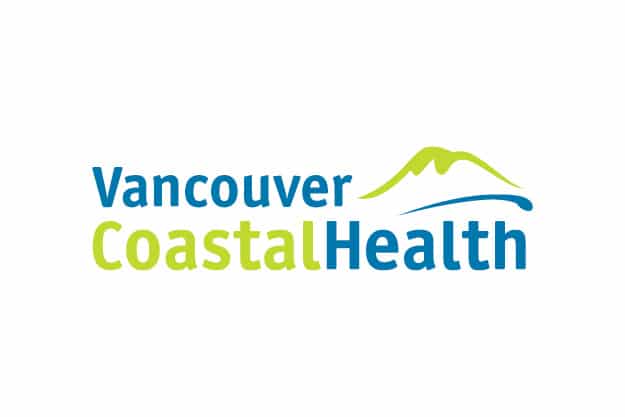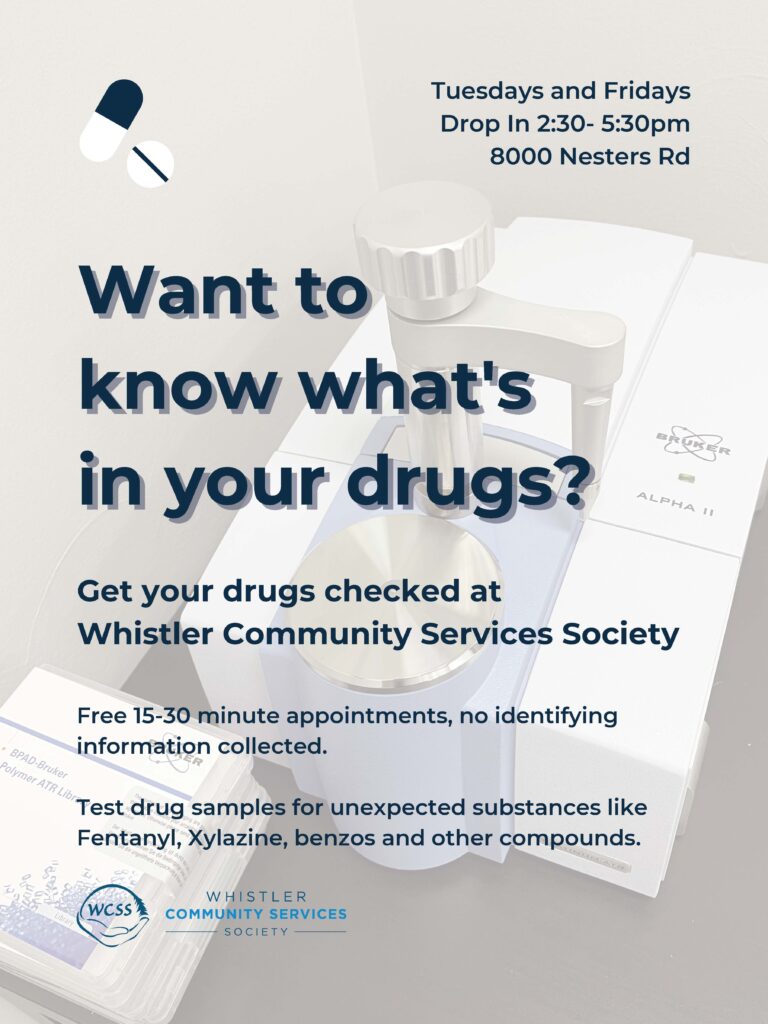Menu
Drug Checking services
Who is it for?
Date & TIMES
When: Tuesdays and Fridays 2:30pm – 5:30pm
Where: WCSS building, 8000 Nesters Road, 3rd floor
What you will get out of it
FAQ
At Whistler Community Services Society Drug Checking, we use a combination of cutting-edge technology and immunoassay test strips to analyze samples of street drugs for the presence of potentially harmful substances. Our special machine, called an FTIR spectrometer, provides an accurate analysis of the drug composition. Additionally, immunoassay test strips allow us to quickly test for potent substances like fentanyl, benzodiazepines, and LSD.
Drug Checking is a free service offered by WCSS. We do not charge a fee for drug analysis, or any other harm-reduction supplies and services.
Appointments are available on a drop in basis Tuesdays and Fridays 2:30-5:30PM and operate on a first-come, first-served basis. The appointment usually takes 10-15 minutes on average, and you can expect to spend approximately 30 minutes with our team to get set up, run the test, and access harm reduction resources or information.
After the test is completed, we deliver the results in person. If you have any further questions or concerns, our team is always available to assist you.
Anyone can access the service and no identifying information is collected to protect anonymity.
The amount of drugs we need to test depends on the form of the substance. Most times, we are able to return most of the sample to you after the test is completed! For solid drugs, we ask that you mix well and provide approximately 10mg, which is about the size of a match head. For liquid substances, a few drops are sufficient, provided they are mixed well. For pills, you may include either the entire pill or 10mg of the crushed pill. Lastly, for blotter drugs, we only require a quarter of a tab for testing purposes. If you have any further questions or concerns about the amount of substance we require for testing, please do not hesitate to contact our team.
We can detect and test various types of drugs, including psychedelics like MDMA and MDA, stimulants like cocaine and methamphetamine, opioids like heroin and fentanyl, as well as others like ketamine, PCP, steroids, and pharmaceuticals like Xanax and Oxycodone (we must crush your pill to test it).
While the FTIR Spectrometer is a powerful tool, there are some limitations to what it can do. For example, it cannot separate each individual component and measure their amounts, and any percentages given are estimates. Additionally, we cannot test organic matter like cannabis or mushrooms, drugs in foods like candies or brownies, or drugs that are active at extremely low levels, such as LSD. We also cannot reliably identify substances mixed in liquid, and we cannot guarantee that all parts of the sample are the same throughout. Finally, while we can tell you what’s in it, we cannot tell whether your pharmaceutical is real or not.
Immunoassay test strips are a type of drug testing tool used to detect the presence of specific substances in a sample. At our drug-checking service, we use these test strips to detect the presence of fentanyl, benzodiazepines, and LSD in samples that are below our 5% threshold for detection using our FTIR spectrometer.
The test strips work by using antibodies that are specific to the target substances. When a sample is applied to the test strip, any of the target substances that are present will bind to the antibodies, causing a visible change on the test strip. The intensity of the change corresponds to the amount of the target substance present in the sample, but the test strips have a threshold for detection, which varies depending on the substance being tested.
While the test strips are not as comprehensive as the FTIR spectrometer, they offer a quick and easy way to detect the presence of certain substances that could be harmful even at low levels.
While the IMMUNOASSAY TEST STRIPS are a fast and easy way to detect the presence of fentanyl, benzodiazepines, and LSD, there are some limitations to their use. The strips cannot indicate the exact amount of the substance present in the sample, only that it is present above the threshold. Additionally, a positive test result does not indicate which specific analogue of the substance is present. For example, a positive fentanyl test could be due to fentanyl or a more potent analogue like carfentanil in the sample. It’s important to use the test strips in conjunction with other harm-reduction strategies to stay safe.
It is important to check your drugs because even if you trust your source, unexpected and dangerous substances may still be present in your drugs. Drug checking can provide information about what is actually in a substance, allowing you to make better-informed decisions and use more safely. Checking your drugs can help reduce the risk of harm and potential overdose.
Drug checking can provide important information about the substances you plan to use. Specifically, it can help identify up to 4-5 substances and cutting agents that may be present in a sample, estimate the percentages of substances in a sample, and determine whether your sample contains fentanyl and some fentanyl analogues, as well as benzodiazepines and some benzo analogues. This information can help reduce the risks associated with substance use and allow you to make more informed decisions. However, it’s important to note that drug checking can’t tell you everything about a substance and doesn’t guarantee safety.
While drug checking can provide valuable information about the substances in a sample, there are also limitations to what it can tell you. For example, drug checking cannot reliably detect substances present in small amounts (less than about 5%) using FTIR. It also cannot provide exact percentages of what is in a sample, detect new or unknown substances not in the reference database, or reliably distinguish between substances with similar chemical make-up. Additionally, drug checking only tests a small sample and cannot determine if the whole drug intended for use is free of adulterants or contaminants due to the “chocolate chip cookie effect.”
The “chocolate chip cookie effect” refers to the phenomenon where different parts of a drug sample can contain varying amounts of the substance and its adulterants or contaminants. This can occur because drugs are not uniformly mixed, leading to some parts of the sample containing higher or lower concentrations of the substance and other substances. As a result, drug checking may only be able to provide information about the small portion of the sample that is actually tested, and other parts of the sample may have different compositions.
If you find out that your drugs are laced or contain unexpected and dangerous substances, you do not have to keep them. The technician at the drug checking site can safely dispose of them for you. It is always better to prioritize your safety and well-being, and disposing of the drugs is one way to do that. It is also important to seek out support and resources if you need help managing your drug use or any related concerns.
WCSS has 2 trained drug checking technicians who will receive the samples and run each drug test. The program is overseen by the British Columbia Centre on Substance Use and we work closely with other drug checking technicians across the province to identify trends and novel substances in the drug supply.
It’s completely confidential. We collect information about the sample contents but no information about the service user is collected, stored or shared with anyone.
No personal data is collected form service users. The data acquired from testing the substance sample will be shared with provincial partners and helps identify contaminated and new/novel substances found in BC. Novel substances will be added to a library to detect similar ones which will be mutually shared with various harm reduction services. Additionally substances may be flagged for public health alerts when there is a high likelihood of overdose or drug poisoning.
How to register
Program supporters



